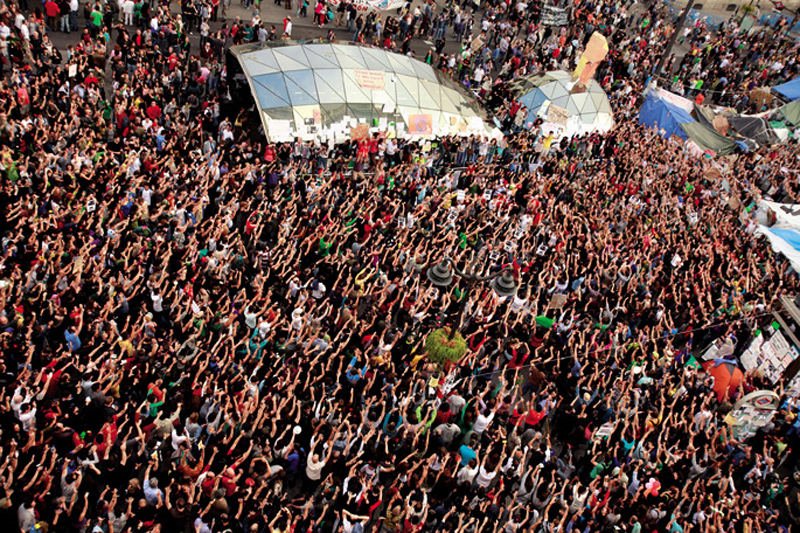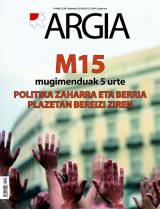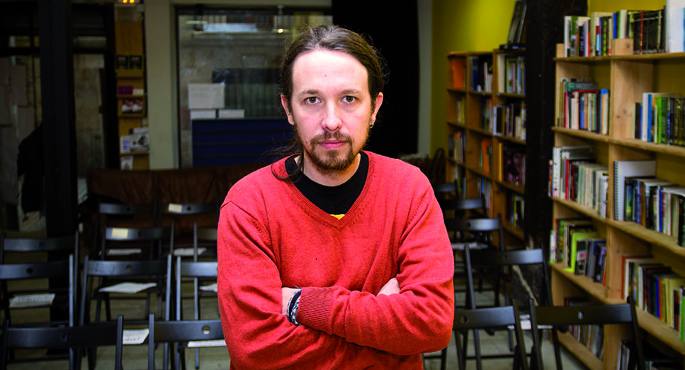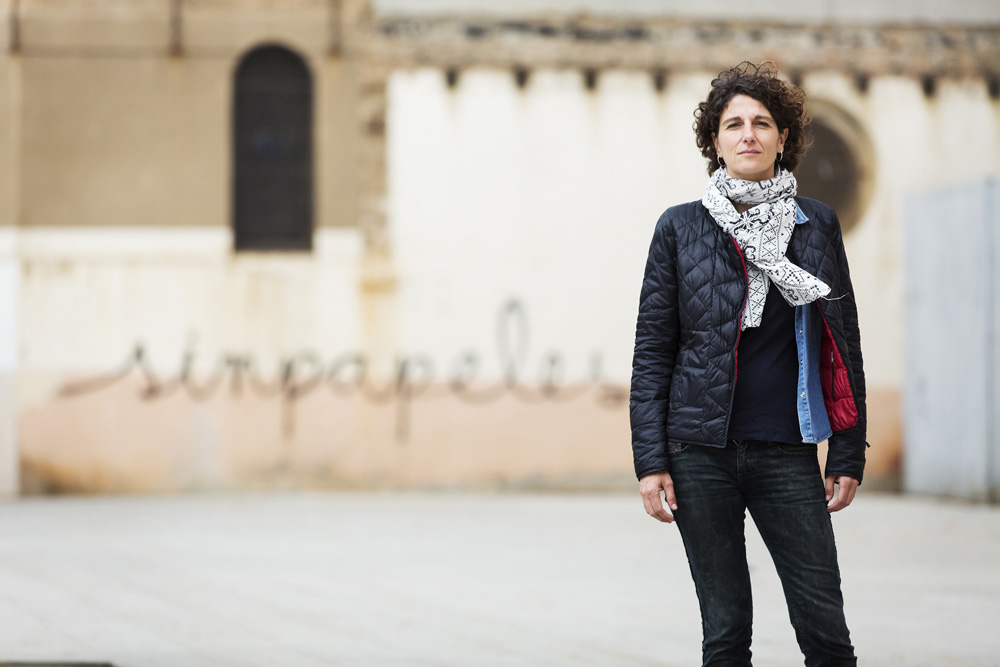Start with the seats, end the political agenda
- On May 15, 2011, several political agents from Euskal Herria were caught offside. The citizens who occupied the seats in demand for genuine democracy plunged the political class into a crisis of representation and the consequences have been noted here, in the form of votes taken by the Podemos party. We have gone back five years to try to understand what has happened in this period.

The passage is from the book The 10 days that revolutionized the world over the Russian revolution, written by journalist John Reed: A member of the Social Revolutionary Party speaks loudly against the Bolsheviks. He says that the peasants will not join the revolution. The journalist asks why, what's the problem. Is the land decree just presented by the Bolsheviks causing discrepancies?
- Oh, the decree of the earth! - He cried furiously. Look, do you know what that decree is? It is our decree, it is the complete program of the Social-Revolutionaries! My party had defined this policy after having carefully examined the wishes of the farmers. It’s a shame to introduce them…
“But if that’s your policy,” Reed replied, “I don’t understand their drawbacks.” Anecdote demonstrates how paradoxical the functioning of political parties can be: although they have been conceived to defend a political project, being also an instrument of representation, it seems that it is sometimes more important who has done the things that are done than the things themselves.
It seemed that the social sector that for years had fought against the Transition of 1978 looked at Plaza Sol with more mistrust than interest.
Anecdote also serves to explain what happened in the Basque Country almost a century later: The reactions that dominated on the independence left on May 15, 2011, a week before the municipal and foreign elections, when thousands of citizens occupied the Plaza del Sol in Madrid after a demonstration under the slogan “Real Democracy Now”, resemble the outrage of the Social-Revolutionary party militant. Faced with those who denounced the lack of democracy in Spain, the sensory arachnid of the Abertzale left responded by saying “we said it a long time ago.” It seemed that some social sector spokesmen, who had been fighting the Transition of 1978 for years, looked with more mistrust than interest at the citizens who began to position themselves against the order of things in Spain.
And according to this reading, the camps that were gradually spreading throughout the Spanish State responded to a political agenda that was not here – although it was only partly true. With the possibility of running for elections after years of illegalization, the forces focused on the fight for the vote.
That four-legged table
At the time, it was difficult to detect what the M15 movement could bring. Camping was also held in the Arriaga de Bilbao, in the Boulevard de Donostia, in the Plaza del Castillo de Pamplona and in the Plaza de la Virgen Blanca of Vitoria-Gasteiz, but who denies it, compared to some Spanish cities, the movement was weaker. The short-term perspective said that the contexts were different, that it functioned the accumulation of nationalist forces on the left of the PNV, that Bildu entered the institutions with a huge muscle. In the media thermal baths of these provinces the concept of quadrangular table became Trending TOPIC: The table, composed of PNV, EH Bildu, PSE-EE and pp, had a guarantee of several years. Dispersed into three different options the four voters of Ezker Batua, who had to think at the time in the fifth political space?
Therefore, issues related to pacification and sovereignty would, according to almost all forecasts, be the ones that would draw the field of play for the following years and not the “sectoral” ones. That is to say, the same subject as before, but in a framework without terrible murders, arrests, torture, threats and other events. A very different context for the left abertzales, with real possibilities for them to become the main forces of the CAV on the horizon, which were cited in the 2012 elections.

Let's go back to Plaza del Sol. A year later, in the mobilizations organized between 12 and 15 May 2012, the path that the M15 is taking is clearer: it has become a phenomenon that brings together many social movements, demands are more concrete; for many who want to do “something” in the face of the social situation, it has become a platform to have a first political experience, understood as an act of influence of politics in the social organization, of course, not only political parties.
In addition, there is an M15 more in places than in the conscience of many citizens. And that is also noted in Euskal Herria, there are already quite clear signs: On the same day, 15 May 2012, the newspapers reported on a survey carried out by the Basque Youth Observatory. In the CAV, 50% of Basques between 15 and 29 years of age welcome the M15 movement at that time, although only 14% have participated in the mobilizations. “It’s the M15 of radios and televisions, of people who never came down to an assembly or a plaza, of the social majority who feel empathy with the M15. And its translation was not a general criticism of the representation, but of the current representation,” explained the political secretary of Podemos Euskadi, Eduardo Maura, in an interview he was held earlier this month on the Rebelion website. “That other M15, that of the imaginaries, that of the songs, that of the slogans, that of the television, entered with force in the Basque Country and did so leaving the left Abertzale next to the old.”
Two woven political moments
It can also be explained in another way: instead of a new political time, in Hego Euskal Herria two were emerging in that period 2011-2012, woven on top of each other. The first was the phenomenon of the Basque Country, as the Basque conflict was focused here, although it had influence in Spain. Secondly, what time has put on top happened throughout the Spanish State and, although not much place on the party agenda here, society followed closely because it gave a positive response to the difficult social situation.
The end of the Basque conflict has not been able to get out of the mud. The movement that began in the plazas, by chapter in chapter, is having a profound influence on the way of understanding the Spanish and Hego Euskal Herria politics.
Two political moments began to weave in 2011: the end of the Basque conflict and the Spanish Transition Culture crisis
Before the M15, politics had great narrative problems in Spain, as it was a game of thrones that exchanged two main actors. But the series was not very successful, and even less so since the PSOE, on 12 May 2010, had joined the International Monetary Fund and the European Union and adopted a harsh austerity plan: 15.000 million scissor strokes. It was only the beginning: it would be followed by the 2010 labour reform, the amendment of legislation for the entry of private capital into savings banks and, above all, almost five million unemployed. A catastrophe on the part of the party that gave the state a social varnish. The fact that the PSOE was subject to the financial powers up to that level changed the chip of many Spaniards: those who imagined themselves as the middle class understood that the welfare state had ended, that the law of the jungle came and that the risk of going back to the standard of living was in any corner – the sword of mortgages on the head, measures against the public sector….
The response of the usual social partners would also have to do with the occupation of places: Trade unionist Valeriano Gómez took office as Minister of Employment in the Spanish Government, just a month after appearing on the front line of the general strike convened in 2010 by UGT and CCOO against the measures taken by the Zapatero Government. This obscene decision showed the social disconnect of the institutions created in defense of workers’ rights, without any agent assuming the task of channeling the concern of many Spanish citizens. “They don’t represent us” didn’t happen to become one of the great slogans of the M15.

Where are things happening?
Instead, Basque society was saying to the independence left and to the Basque unions that “you represent us”. Or at least that seemed in view of the results of the elections that followed the illegalization. The unions here were also much more active in responding to the cut in social rights: Between 2009 and 2013, eight general strikes were held in the Basque Country, five of them convened by ELA and LAB, one supported by UGT and CCOO and only two held by unions based in Spain, according to the call of the unions.
Although the mobilisations were of all kinds and the limits of this type of union action were evident – nothing new came after the one-day stoppages, the Basque institutions could always argue that the situation was not as serious as that of Spain – in the imagination of many Euskal Herria was still the vanguard of the fight against the financial coup. According to this narrative, the “true politics”, which affects people’s daily lives, was a phenomenon located mainly in the Basque Country. The armed conflict gave a special – and dramatic – intensity to the fighting of the parties here, it was much stronger than the normal confrontation of administrative management, and it affected almost all areas of society.
The left of Euskal Herria had enough credibility to respond to the financial coup, but not to pose the social conflict in different terms.
The Left of Euskal Herria had strong representation mechanisms in this context, but the moment of May 2011 presents a paradox: when the social agenda radically changed, and the new subjects – evicted, precarious, young people who have to emigrate in search of work… – gained a greater prominence, the classical responses were imposed here by the strength and credibility of the traditional actors to do so. But not to raise the conflict against economic powers in different terms. And those who were looking for something new heard from Dolby Surround that news was now coming from elsewhere. From there, the issue will no longer be limited to the socio-political dichotomy Euskal Herria or Spain, but it will also have to do with the cultural clash between new and old imaginaries. In that area, from one point on, things are happening elsewhere and not so much in the Basque Country.
Something that the PNV has also understood
Both formations have read more appropriately all the facts that have been detected over the past five years. You're Bay-Ahal dugu, of course. Although some have understood the Pablo Iglesias party as an electoral translation of the M15, the operation seems more complex, among other reasons because it is not easy to create a political party from a movement that began to radically criticise the institutional representation – others tried, such as Party X, and with very poor results. The announcement of Churches to attend the 2014 European elections was criticized by the movement, but with the results obtained since then the dwellings have been able to seduce some of those who most criticized the partiality.
They have also achieved the M15 of the population that did not participate in the M15, taking advantage of the symbolic universe of the movement, which had a good appreciation of public opinion. Above all, they have been able to create the right framework for their offer: “Old politics vs. new politics” or “casta vs. people” are the interpretations of the M15 in hegemonic key. But these interpretations could hardly have worked for a large number of voters, had there not been a profound change in social movements before. This point should be emphasized, since some readings from the independence left on Podemos emphasize the political engineering of the party, forgetting the social and cultural phenomena that have made it possible.
The PNV has been able to reinvent itself in order to provide a conservative response to social concerns over the past five years. Style speeches "here is best managed" hide social unrest
The other party that has read the meaning of the M15 in the CAV has been the PNV. In the face of a crisis situation, societies can provide different answers and, depending on them, whether or not they can drive change dynamics. The outraged movement helped to recognise that in Spain the dream of the middle class is over. Welfare was going to be something that had to be “recovered” and that promise was not in the hands of most parties.
In Álava, Bizkaia and Gipuzkoa, on the other hand, the collective imaginary has not been as well integrated as the measures of recent years have affected the welfare state. Although in the CAV the labor reforms, the cutbacks and the climate of precarization have obvious consequences, the style speeches “here is best managed” have impacted on the charts of successes and the PNV has not been bad for the climate of Spain, since next to this photo it is shown with good plan.
Traditional nationalism has reinvented itself over the past five years. If it was formerly the party of “normal” Basque citizenship, this effect has multiplied in the years of crisis: it is they who talk about creating jobs, companies and families. They have understood the sense of helplessness caused by complicated social situations in many citizens and have prepared an effective conservative response, a comparative framework where all the numbers say that we live better than in Spain.
Nobody's going to ask for change if they think things aren't going that bad. And if you believe that the PNV is responsible for the situation being a little better than elsewhere, you will vote again without stirring up. It is the antithesis of the M15, as anonymous and multitudinous as the movement of plazas, but without slogans, assemblies or transformations. A normal person option that conforms to survival. Grey as the colour that Basque policy is acquiring.
David Lloyd, V for Vendetta komiki ezagunaren sortzaileetako bat, Gasteizen izango da otsail hasieran. Ignacio Aldecoa kultur etxeak eta Caracola Comic-ek hiru eguneko jardunaldiak antolatu dituzte komiki horren inguruan.
Madril du bizitoki eta sorleku 1978tik. Politika-zientziak irakasten ditu Madrilgo Complutense unibertsitatean. La Tuerka eta Fort Apache solasaldi politikoen aurkezlea delako ezagutzen dugu. Blogaria da Publico.es webgunean, eta aurki zinema eta politikari buruzko liburua... [+]
Egunak joan ahala, biziraupenaren larritasunik gabe eta denboraren prespektiba lagun, 23 egun iraun zituen Gipuzkoa Zutik kanpaldiari buruzko analisiak gehitzen doaz. Hainbat kidek Amador Fernandez Savaterrekin izandako elkarrizketatik ideia hauek bildu ditugu.
Lau urte bete dira M15 mugimenduak Espainiako Estatuko hirietako plazak hartu zituenetik. Mayo Global 2015M koordinadorak larunbaterako mobilizazioak deitu ditu Espainiako hemeretzi hiritan. Era berean, maiatzaren 23an, hauteskundeen bezperan, mobilizazioa deitu du.
2011an M15 mugimendua eragin zuen manifestazioan atxilotutako 14 gazte inputatu dituzte, hiru urte eta bost hilabete geroago.
Herritarren segurtasuneko lege-proiektua onartu zuen ostiralean Espainiako Ministroen Kontseiluak. Hainbat eragile sozialekin eta organismo publikoekin hitz egin ostean, lege-proiektuan aldaketa batzuk onartu dituztela azaldu du Fernandez Diaz Barne Ministroak. Hala ere, askok... [+]
Espainiako Auzitegi Nazionalak ez ditu Kataluniako Mossoek aurkeztutako frogak onartu, eta absolbitu egin ditu 2011ko ekainaren 15ean murrizketen aurka egindako Aturem el Parlament ekintzagatik auzipetutako hogei lagunetatik hemeretzi.
Eduardo Muriel kazetariak Podemosek Europako hauteskundeetan izan duen arrakasta aztertu du La Marea hedabidean.
Oso komentatua ari da izaten Rockdelux aldizkariak Nacho Vegasi egin dion azken elkarrizketa. Eta ez kontu musikalengatik, hain juxtu.
Espainiako Barne ministerioak “Herritarren segurtasunerako legea” aldatuko duela adierazi du, jaso dituen kritikek eraginda.
























